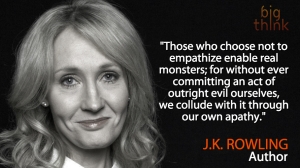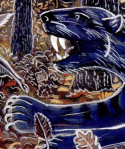It’s a great time to be a fan of J.K. Rowling’s wizard-based adventures (we’ll forget about Casual Vacancy – I haven’t gotten into the Robert Galbraith novels and won’t anytime soon):
We’ve got not only the stage production of Harry Potter and the Cursed Child + the script-book accompaniment being released this weekend, but can also look forward to the beginning of a movie trilogy launching this November with the opening of Fantastic Beasts and Where to Find Them (based on what can barely be considered more than a short story).
And, of course, there’s all the shenanigans happening over on the Pottermore site with marketing ploys disguised as “backstory.”
It’s the last bit that’s keeping me—once a raging Potterhead—decidedly cool to all things Jo.
To recap: Rowling seems to be channeling Lockhart-like ego and real-world dismissiveness when it comes to Indigenous criticisms of her History of Magic in North America writings released as lead ups to the Fantastic Beasts films. While seemingly a staunch liberal supporter of inclusion and diversity, i.e. gay Dumbledore and Black Hermione, Rowling purposefully bulldozes (read: obliviates) very real spiritual and cultural understandings of the Native people she’s appropriating (read: stealing) aspects of her HOMINA stories from. Like the narcissistic Lockhart who’s well-loved the world over for writing books, Rowling’s global legion of rabid fans have harassed and trolled Native critics who (as many were fans of her magical work themselves) only asked that she try harder (or, you know, try at all) to be more sensitive, more creative, and less Euro-centric in her work based across the pond on Turtle Island. Generally known for engaging fans online, Rowling has simply blocked Natives out of sight and out of mind. Celebrity is as celebrity does, eh, Jo?
All that and I’m just… sad. Normally, I’d be napping in anticipation of tonight’s midnight release party, at which my daughter would join me (her first book release party!), as she is just as much a fan as I am. But this all feels like a party we’re not invited to and wouldn’t even want to attend if we were, because of Rowling’s arrogant and entitled stance against Native participation in her world.
So I wrote a poem instead. If you’re so inclined, you can hear me read it on SoundCloud.
We’ve been here before:
White folks whoring –
I’m sorry, exploring –
Brown territories.
Always expanding,
never understanding
our declarations
of Indigenous affirmations.
And like ships led astray across waters of
righteous infestation,
these pale people with their
morally-flexible navigation
wash ashore and
lay claim to our innovations
– lands, bodies, ideas.
Their fear
of being less
manifests
as “It’s mine”
while they evangelize
the gospel according to Harry.
We’ve been here before:
White destinies shaped by
brown erasure.
Greener pastures
await
on the other side
of the racial divide.
So we hide our kids, our wives,
our lives
from that white gaze that can’t see
past complexion.
We’ve been here before:
This desire for more
looks like lost Italians, found religions, bestsellers.
White quellers
silence Indigenous critique
while appropriating
everything
they never bled for.
White doublespeak
is staying silent
about brown struggles
while promoting racist depictions
as creative fiction.
That’s not applause you hear;
that’s us trying to free ourselves from the chains
of your good intentions.
We’ve been here before:
A history of magic in North America –
what we call Turtle Island –
began long before white tyrants
jumped the pond
literally
or literarily.
Colonial folks saw our medicines, our Nature, our matrilineal societies,
our independent democracies
and thought:
“Magic.”
Not unreal. Not unbelievable.
But powerful.
Like a rocket’s red glare
white allies fade into thin air
– disapparate –
when they see our flare,
only to apparate
into our mentions
with tools of oppression:
Guns, nuns, aggression, suppression,
Books.
These the only kind of white magics we can believe in:
Save the wizard; kill the Indian.

We’ve been here before:
A white person gets rich off our images of yore.
Our images of now? Ignored.
You’re a culture
vulture.
That’s the house you’ll be sorted into.
Home of the cursed colonial –
on your door we’ll count coup.
We weren’t here first.
We were here
always.
No wands necessary.
It was your savagery got us into this mess.
You could fix it but there’s no profit in decency.
The true fiction here is that you care.
You don’t. We get that.
Remember: We’ve been here before.
But you’ve been here before, too.
#YesAllWhitePeople
Have the privilege of repeating their errors
over and over and over.
But
we see you.
And unlike goblins, giants, and house elves,
we’re real AF
comin attcha with 600 years of receipts.
And we’re ready to eat, so make space at the table.
Take your place at our feet, ready to LISSEN J.K. LISSEN
to OUR stories – OUR truths –
these are not myths
for you to play with.
The magic happens when we represent OURSELVES.
We are not part of your empire.
We are not entertained.
Our cafeteria tables are full.
Make no mistake, this is life and death for us.
And we know what real monsters look like.

…
A good review of what’s wrong with Ilvermorny, the North American school for witches and wizards. Below are the four houses of Ilvermorny, whose images and stories are misrepresented and stolen from many a living Native tribe and tradition.
Here I leave you with interpretations of the actual creatures as presented by Indigenous artists, past and present.
A Horned Serpent in a Barrier Canyon (Utah) Style pictograph.
Wampus Cat by Murv Jacob (Cherokee).
“Pukwudgie Pipe” carved with only traditional tools made by the artist, Jonathan Perry-Aquinnah (Wampanoag).
Doll depicting Thunderbird and stars by Michael McLeod (Bad River Band of the Lake Superior Tribe of Chippewa Indians).












